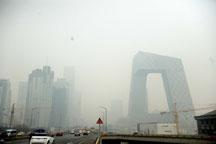Hospital admissions rise in Beijing over weekend

 0 Comment(s)
0 Comment(s) Print
Print E-mail CNTV, February 25, 2014
E-mail CNTV, February 25, 2014
For days now, many parts of China have seen hazardously high air pollution. On Monday, Beijing's reading for tiny - but toxic - particles in the air soared to 397, a level classed as "hazardous" to breathe. Over the weekend, hospital admissions in the capital shot up.
Li Lianghe brought his three-year-old son, Li Haifan, into hospital today. He says he's been sick since the smog began.
"He's had a fever since Friday, when the air pollution became really bad. He's been coughing and having trouble breathing. It's all because of pollution. Normally, he's very healthy," Li said.
He isn't the only child struggling to breathe. Hospital staff say they're seeing a surge in patients.
"This weekend, we've seen 10 percent more patients than last weekend, many suffering from respiratory infections, mostly children and the elderly. The pollution has definitely had an impact," Wang Ruiqin, doctor of the First Affliated Hospital of Tsinghua University, said.
The hospital has needed twice the staff, to cope.
"We normally only have one doctor on duty per station. But this weekend, we had to put two doctors on," Cui Rong, doctor of the First Affliated Hospital of Tsinghua University, said.
Since Friday, residents in north and central China have battled hazardous air… Forcing Beijing municipal government to issue an orange alert, for the first time this year.
This prompted schools to cancel outdoor sports and health officials to tell children and the elderly stay inside.
This might look unhealthy, but it's what you can't see that's most dangerous: tiny particles, less than 2.5 micrometers wide, known as PM2.5. Small enough to embed deep in the lungs, these lead to a higher risk of stroke, heart disease and lung cancer, which Beijing's health authority says is now the biggest killer in the capital. On Monday, Beijing's air quality index put the city's PM2.5 levels at 397. That's more than 15 times the World Health Organization’s safe limit.
In the neighbouring city of Tianjin, PM2.5 levels on Monday were even worse, At 421. In Taiyuan, capital of Shanxi province, they reached 217 - a level still classed as "unhealthy."
With millions returning to work after the weekend, Doctor Cui Rong had this advice:
"There's not much you can do, but ideally, avoid crowded places, avoid going outside - and if you do, wear a mask," Cui said.
Beijing has sent investigators to factories outside the city, to see if they are breaking emission rules.
But it's highest pollution alert, red - which would halve the number of cars on it's roads - has yet to be raised. Leaving families like the Lis to do what little they can, to protect their health.





